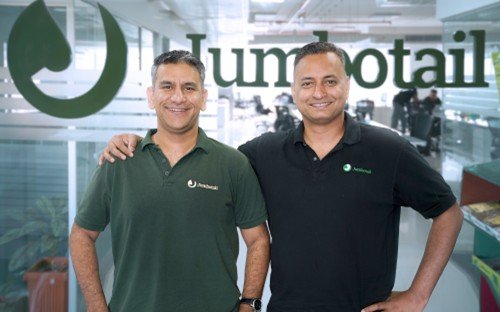The Kirana Renaissance: Jumbotail’s Story to a $1 Billion Valuation


The year is 2025. The air in Bengaluru, a city that runs on code and chai, crackles with the news. On June 30th, Jumbotail—the B2B e-commerce and New Retail platform for food and grocery—closed a landmark $120 million Series D funding round, led by SC Ventures, the innovation arm of Standard Chartered Plc. The news wasn’t just about the dollar amount; it was the final, definitive stamp: Jumbotail was officially India’s newest Unicorn, valued at over $1 billion. It had taken a decade, but the ‘Kirana Renaissance’ they championed had arrived.
This was no overnight sensation; it was a methodical, principle-driven scaleup story. Co-founders S. Karthik Venkateswaran and Ashish Jhina had spent years in the trenches of the Indian Army and Silicon Valley, respectively. Their mission, forged in a Stanford MBA classroom, wasn’t to compete with the humble kirana store, but to arm it. They saw not a fragmented, struggling ecosystem, but the resilient, $600-billion-plus backbone of Indian retail—a backbone that simply lacked modern tools.
Phase I: The First Principles of Scale (2015-2021)
The early years were defined by building an infrastructure that seemed insane to the VCs of the time: a full-stack, tech-powered supply chain. While others chased scale-at-any-cost, Jumbotail chased capital efficiency and operational excellence. Their proprietary ‘GoldenEye’ Retail Operating System was a testament to this, giving a small shopkeeper the power of a modern supermarket manager: digital invoicing, inventory tracking, demand forecasting, and a crystal-clear P&L.
“We solved logistics first,” Karthik often said. “If the product doesn’t arrive on time, in full, and at the right price, nothing else matters.” Their in-house logistics, initially a source of investor skepticism, became their competitive moat. By 2021, Jumbotail boasted a 98% order fill rate and 95% on-time delivery—numbers unheard of in the fragmented B2B grocery space. This reliability built trust with the small and medium kiranas—a trust that was the bedrock of their next, most crucial step.
Phase II: The Credit Multiplier (2022-2024)
By the beginning of 2022, the e-commerce platform had gained traction, serving tens of thousands of retailers. But the founders knew the deepest pain point of the kirana owner: working capital. The traditional kirana was constantly beholden to wholesalers and distributors, caught in a tight, often exploitative, cash cycle.
This is where Jumbotail Capital, their embedded fintech platform, became the scaleup catalyst. Leveraging transactional data from the e-commerce platform—every order, every payment, every restock—they created a proprietary credit scoring model. They partnered with lending institutions, offering small, collateral-free credit lines right in the app. This wasn’t just an add-on; it was an enabler. A kirana could now order more stock, increase its range, and capture more sales without worrying about immediate upfront payment. This boosted the average order value (AOV) and the purchase frequency of their retailers, creating a virtuous, compounding loop. By late 2024, Jumbotail Capital was responsible for a quarter of the company’s overall revenue, a powerful demonstration of product-market fit in a financial services-starved sector.
Phase III: The Leap to Unicorn Status (H1 2025)
The final push for unicorn status came with a strategic, industry-defining move in the first half of 2025: the acquisition of Solv India. Solv, a B2B commerce and financial services platform incubated by the funding round’s lead investor, SC Ventures, brought two critical elements to the table:
- Category Expansion: Solv allowed Jumbotail to seamlessly integrate non-grocery categories—apparel, footwear, electronics, and home furnishings—expanding their platform to serve as a full-stack MSME commerce solution, not just a grocery one.
- Network Deepening: The merger immediately expanded Jumbotail’s reach to over 500,000 retailers and MSME sellers across 400+ cities and towns, significantly boosting their presence in Tier 2 and Tier 3 markets.
The Series D funding, led by SC Ventures and joined by existing backers like Artal Asia, was the financial validation of this strategic vision. The capital infusion wasn’t for vanity; it was explicitly earmarked for AI-native solutions and talent acquisition in Decision Science and Machine Learning. The goal was to cement their leadership by building the most efficient and lowest-cost supply chain in the country—an AI-powered gateway to India’s mass-market consumption.
On June 30, 2025, the internal email announcing the unicorn milestone went out, signed by both Karthik and Ashish. It wasn’t just a celebration of a $1 billion valuation; it was a celebration of the hundreds of thousands of small businesses they had empowered. The true scaleup was never about the valuation multiple; it was about the impact multiple—empowering a million retailers to serve 400 million middle-income Indian consumers. The Kirana Renaissance was finally an economic reality.
Disclaimer: We do not claim ownership of any data, images, or thoughts shared on this article. Content is based on publicly referenceable data and provided for informational purposes only and the. Any views expressed belong to their respective owners. We strive for accuracy but disclaim liability for reliance on the content